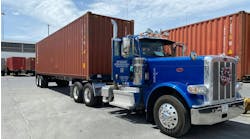Maj. Forrest Burke, chief of logistics information management at Camp Arifjan, Kuwait, for the Coalition Forces Land Component Command (CFLCC), recently told Federal Computer Week that technology provided by Vistar Datacom has been installed on about 500 vehicles and containers throughout southwest Asia that are traveling to places where RFID interrogators can't track their movements.
The Vistar GlobalWave units include a global positioning system satellite receiver and antenna and a long-life battery stored in a heavy-duty box that is affixed to the critical cargo with six magnets, Burke said. The tags can be tracked every 30 to 60 minutes with the data relayed back to a server here, he said.
"We can see where the trucks are going, the number of vehicles and when they're going into Iraq," Burke said. "There are a few in field convoys and on other critical shipments. We use them when we don't have RFID interrogators to see."


